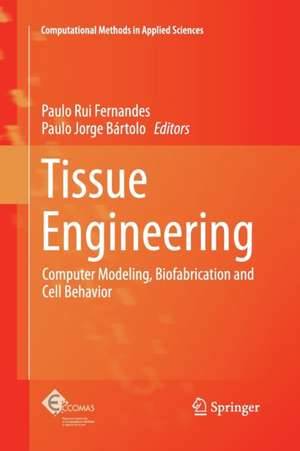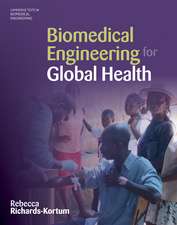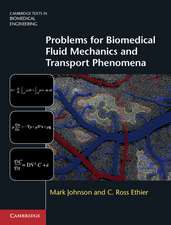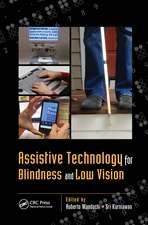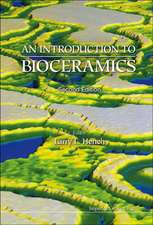Tissue Engineering: Computer Modeling, Biofabrication and Cell Behavior: Computational Methods in Applied Sciences, cartea 31
Editat de Paulo Rui Fernandes, Paulo Jorge Bartoloen Limba Engleză Paperback – 23 aug 2015
Tissue Engineering is a multidisciplinary field involving scientists from different fields. The development of mathematical methods is quite relevant to understand cell biology and human tissues as well to model, design and fabricate optimized and smart scaffolds.
Emphasis is put on mathematical and computational modeling for scaffold design and fabrication. This particular area of tissue engineering, whose goal is to obtain substitutes for hard tissues such as bone and cartilage, is growing in importance.
| Toate formatele și edițiile | Preț | Express |
|---|---|---|
| Paperback (1) | 709.87 lei 43-57 zile | |
| SPRINGER NETHERLANDS – 23 aug 2015 | 709.87 lei 43-57 zile | |
| Hardback (1) | 716.65 lei 43-57 zile | |
| SPRINGER NETHERLANDS – 13 aug 2013 | 716.65 lei 43-57 zile |
Din seria Computational Methods in Applied Sciences
- 15%
 Preț: 655.27 lei
Preț: 655.27 lei - 15%
 Preț: 651.51 lei
Preț: 651.51 lei - 15%
 Preț: 657.73 lei
Preț: 657.73 lei - 5%
 Preț: 709.87 lei
Preț: 709.87 lei - 18%
 Preț: 1116.26 lei
Preț: 1116.26 lei - 18%
 Preț: 947.35 lei
Preț: 947.35 lei - 18%
 Preț: 1224.54 lei
Preț: 1224.54 lei - 18%
 Preț: 952.89 lei
Preț: 952.89 lei - 18%
 Preț: 947.35 lei
Preț: 947.35 lei - 20%
 Preț: 653.38 lei
Preț: 653.38 lei - 18%
 Preț: 954.45 lei
Preț: 954.45 lei - 15%
 Preț: 638.76 lei
Preț: 638.76 lei - 18%
 Preț: 1005.74 lei
Preț: 1005.74 lei - 20%
 Preț: 648.59 lei
Preț: 648.59 lei - 18%
 Preț: 954.45 lei
Preț: 954.45 lei - 20%
 Preț: 640.19 lei
Preț: 640.19 lei - 18%
 Preț: 1231.16 lei
Preț: 1231.16 lei - 24%
 Preț: 789.36 lei
Preț: 789.36 lei - 18%
 Preț: 946.41 lei
Preț: 946.41 lei - 20%
 Preț: 567.62 lei
Preț: 567.62 lei - 15%
 Preț: 639.25 lei
Preț: 639.25 lei - 18%
 Preț: 952.57 lei
Preț: 952.57 lei - 15%
 Preț: 636.80 lei
Preț: 636.80 lei - 15%
 Preț: 650.69 lei
Preț: 650.69 lei - 18%
 Preț: 952.26 lei
Preț: 952.26 lei - 18%
 Preț: 1239.99 lei
Preț: 1239.99 lei - 5%
 Preț: 716.65 lei
Preț: 716.65 lei
Preț: 709.87 lei
Preț vechi: 747.23 lei
-5% Nou
Puncte Express: 1065
Preț estimativ în valută:
135.83€ • 142.20$ • 112.39£
135.83€ • 142.20$ • 112.39£
Carte tipărită la comandă
Livrare economică 07-21 aprilie
Preluare comenzi: 021 569.72.76
Specificații
ISBN-13: 9789400798380
ISBN-10: 9400798385
Pagini: 188
Ilustrații: VII, 178 p.
Dimensiuni: 155 x 235 x 10 mm
Greutate: 0.27 kg
Ediția:Softcover reprint of the original 1st ed. 2014
Editura: SPRINGER NETHERLANDS
Colecția Springer
Seria Computational Methods in Applied Sciences
Locul publicării:Dordrecht, Netherlands
ISBN-10: 9400798385
Pagini: 188
Ilustrații: VII, 178 p.
Dimensiuni: 155 x 235 x 10 mm
Greutate: 0.27 kg
Ediția:Softcover reprint of the original 1st ed. 2014
Editura: SPRINGER NETHERLANDS
Colecția Springer
Seria Computational Methods in Applied Sciences
Locul publicării:Dordrecht, Netherlands
Cuprins
Preface.- 1. Cell mechanics: The role of simulation Stem Cell-Based Tissue Engineering for Bone Repair: Influence of cell communication and 3-D cell-matrix environment, by Swathi Damaraju and Neil A. Duncan.- 2. In silico biology of bone regeneration inside calcium phosphate scaffolds, by Aurélie Carlier, Hans Van Oosterwyck and Liesbet Geris.- 3. Constitutive Effects of Hydrolytic Degradation in Electro-spun Polyester-urethane Scaffolds for Soft Tissue Regeneration, by Hugo Krynauw, Lucie Bruchmüller, Deon Bezuidenhout, Peter Zilla, Thomas Franz.- 4. 4D numerical analysis of scaffolds: a new approach, by A. C. Vieira, A. T. Marques, R. M. Guedes, V. Tita.- 5. Microrheology of Biopolymers at non-thermal regimes, by Rommel G. Bacabac, Heev Ayade, Lara Gay M. Villaruz, Raymund Sarmiento, Roland Otadoy.- 6. Optimization approaches for the design of additively manufactured scaffolds, by Sara M. Giannitelli, Alberto Rainer, Dino Accoto, Stefano De Porcellinis, Elena De-Juan-Pardo, Eugenio Guglielmelli, Marcella Trombetta.- 7. Rational Design of Artificial Cellular Niches for Tissue Engineering, by Ana Sancho-Erkizia, Javier Aldazabal, Alberto Rainer, Elena M. De-Juan-Pardo.- 8. Photocrosslinkable materials for the fabrication of tissue-engineered constructs by stereolithography, by Rúben F. Pereira, Paulo J. Bártolo.
Recenzii
From the book reviews:
“This is an outstanding reference on in vitro and in vivo regrowth of soft tissues. The use of connective tissues stem cells (mesenchymal) is explored in detail. … I highly recommend this book for engineers, orthopaedic, plastic, and general surgeons. … I highly recommend this book to all audiences.” (Joseph J. Grenier, Amazon.com, August, 2014)
“This is an outstanding reference on in vitro and in vivo regrowth of soft tissues. The use of connective tissues stem cells (mesenchymal) is explored in detail. … I highly recommend this book for engineers, orthopaedic, plastic, and general surgeons. … I highly recommend this book to all audiences.” (Joseph J. Grenier, Amazon.com, August, 2014)
Textul de pe ultima copertă
This book describes the state of the art on computational modeling and fabrication in Tissue Engineering. It is inspired by the ECCOMAS thematic conference, the European Committee on Computational Methods in Applied Sciences, on Tissue Engineering, held in Lisbon, Portugal, June 2-4, 2011.
Tissue Engineering is a multidisciplinary field involving scientists from different fields. The development of mathematical methods is quite relevant to understand cell biology and human tissues as well to model, design and fabricate optimized and smart scaffolds.
Emphasis is put on mathematical and computational modeling for scaffold design and fabrication. This particular area of tissue engineering, whose goal is to obtain substitutes for hard tissues such as bone and cartilage, is growing in importance.
Tissue Engineering is a multidisciplinary field involving scientists from different fields. The development of mathematical methods is quite relevant to understand cell biology and human tissues as well to model, design and fabricate optimized and smart scaffolds.
Emphasis is put on mathematical and computational modeling for scaffold design and fabrication. This particular area of tissue engineering, whose goal is to obtain substitutes for hard tissues such as bone and cartilage, is growing in importance.
Caracteristici
Presents recent developments of modeling and fabrication in tissue engineering Distinguished researchers in the field Reflects the multidisciplinary character of the field from biology to scaffold material and fabrication Includes supplementary material: sn.pub/extras
